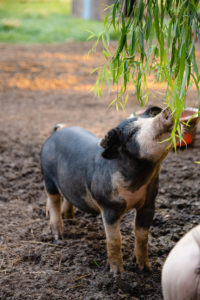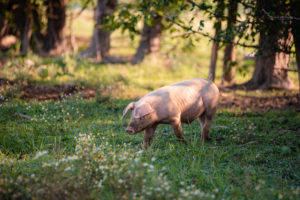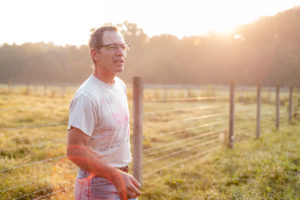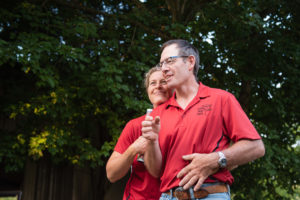Pandemic Pivot at Destiny Farm Cattle
Salvaged hogs raised the way “Grandpa used to farm”
Words by Rebecca Ferlotti
Photos by Kaitlin Walsh
The moment you start down the gravel pathway at Destiny Farm Cattle-quintessential red barn in the distance-you hear the excited squeals of hogs. “We weren’t quite ready for the hogs,” says Hendrick Leibrandt, “but we decided to take a field and spend late nights getting the field ready for them.
He and his wife, Mary Waickman, run Destiny Farm Cattle together in Medina, Ohio, and the pandemic made that all the more difficult, especially when it came to livestock. “You heard horror stories last year of a lot of food getting dumped, and that’s a sad story” says Leibrandt. “That was the big thing: We didn’t want these animals to go to waste.”
The couple decided to buy a truckload of hogs from a farm that had excess. Farms can have contracts with mass production facilities (often called factory farms) but if the contract gets canceled, farmers are left with a surplus of livestock. Sometimes, they can sell their livestock at a loss, which was the case when Destiny Farm Cattle purchased their hogs. But depending on the terms of the contract, some farmers are not allowed to sell their livestock to others or even give it away. “I’ve heard stories about chicken production places where they literally dig a big hole, euthanize the chickens, and bury them,” Leibrandt says.

The supply chain during the pandemic was massively affected by animal production and processing facility workers becoming ill. When workers contracted COVID-19, it frequently caused mass shutdowns of plants. When that occurred, farmers were left with the livestock that was meant to go to the factory farms and, ultimately, the slaughterhouse.
Destiny Farm Cattle did not want these hogs to be needlessly killed. By purchasing the hogs, “they would get to spend time outside,” Leibrandt says. “And then we would find a better use for them for our people in the community.”
Once the field at Destiny Farm Cattle was ready for the hogs, the acclimation process started-for Leibrandt and Waickman as well as for the hogs. Factory farms often have thousands of animals in one facility, confined in cubicles of sortsto promote weight gain. Much like the way a factory functions, the process of getting the animals in and out is fairly quick, so the lifespan of these animals is shortened. “So many animals are raised in sterile, plastic environments,” says Waickman.
The Destiny Farm Cattle way of raising hogs goes back to “how grandpa used to farm,” Leibrandt says. “They get to run around. Or if they don’t want to do anything, they just relax. You watch them play with each other, chase geese and wrestle. Some of them will be sunbathing and some will be in the shade just chilling.” Leibrandt recalled the first rain the hogs experienced was equal parts comical, endearing and disheartening: The hogs were rolling around in the mud and running laps around the field, stopping to stare at the night sky. “It was very nice to see them change from this robot kind of hog to actually be a little more natural,” says Leibrandt. “They adapted pretty quickly. Nature always takes control back.”
Destiny Farm Cattle raises cattle and lamb in addition to hogs. Their philosophy of farming is what many would consider “old school,” very similar to the Amish way. Where Leibrandt is from-South Africa-contributes to that a bit. “South Africa was originally established in 1651, which if you go back in history, was under British control. A lot of Dutch were working for the British, and those Dutch settlers were put in South Africa to start raising food for ships that docked there,” Leibrandt says. This way of farming presents itself in many different aspects. For instance, Destiny Farm Cattle does not use any chemicals to control weeds, something Leibrandt says the fireflies love. “We just drag our fields because, with cattle on the fields, their manure fertilizes the fields. This is the more natural way. Then when it rains, the manure breaks down. We try to put back everything we get out of [the land],” says Leibrandt. “The healthier your soil, the healthier grass you’re going to have, the healthier the cattle you’re going to have.”
 Leibrandt and Waickman call where they send their livestock their “final destination.” They opt to have the animals killed humanely at a local facility with someone they trust. Because the livestock were raised with care, they’re not scared by people when they arrive at their final destination, so they aren’t distressed in their last moments. While this process is difficult, Leibrandt and Waickman know they gave the animals a life-something that livestock doesn’t always get. “Yes, we do raise them for food, but we also need them, so we need to do right by them,” says Leibrandt. “Just because you have the power over something or somebody doesn’t mean you have to disrespect them.”
Leibrandt and Waickman call where they send their livestock their “final destination.” They opt to have the animals killed humanely at a local facility with someone they trust. Because the livestock were raised with care, they’re not scared by people when they arrive at their final destination, so they aren’t distressed in their last moments. While this process is difficult, Leibrandt and Waickman know they gave the animals a life-something that livestock doesn’t always get. “Yes, we do raise them for food, but we also need them, so we need to do right by them,” says Leibrandt. “Just because you have the power over something or somebody doesn’t mean you have to disrespect them.”
Leibrandt and Waickman work from sunup to sundown almost every day because farming for them isn’t just taking care of their livestock … they also have a store to manage. Their farm store, at 3821 Granger Road in Medina, is open Monday through Friday 11am to 6pm and Saturday 11am to 4pm.
Locality is key in this operation; items they don’t produce themselves-including poultry, milk, and butter-come from other local farms. “We don’t raise everything but we’re no more than two steps away from it,” Waickman says. “If we don’t know the farms, we know the people who know them.”
While the local community in Medina has shown a great deal of support, sometimes people travel many miles to stock up on Destiny Farm Cattle’s farm-raised meat. If they don’t go to the store directly, they might stop at Planet Flag Brewing for a burger made from Destiny Farm Cattle’s ground beef. (As a mutual benefit, Plant Flag’s spent grain goes into the hogs’ food.)
“We thank our customers because, without them, we’d have a hard time. People support us and we’re very thankful for that. That keeps us going,” Leibrandt says.
